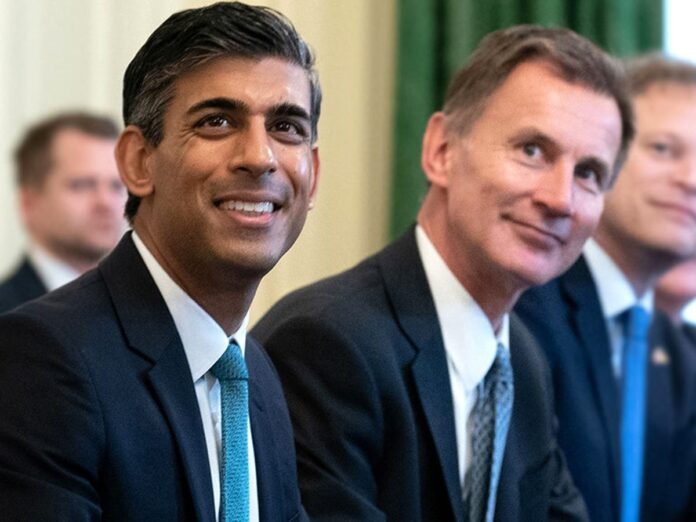Rishi Sunak has been accused of locking the UK into a “vicious cycle of stagnation” as the Bank of England raised interest rates and predicted the longest recession in a century.
Labor leader Sir Keir Starmer said families now face “a Conservative mortgage premium” with the Bank’s 0.75 point rise to 3% in base rate likely to be passed on in the form of more expensive home loans.
As Chancellor Jeremy Hunt issued a fresh signal of austerity in his Autumn Statement this month, businesses warned against repeating the mistakes of the early 2010s by cutting public investment.
And the TUC renewed its call for an immediate general election to allow voters to pass judgment on the package of tax rises and spending cuts that Mr Hunt predicted in his November 17 statement. More than 460,000 have signed one Independent petition for an early election.
Hunt left no doubt that there will be more pain in the Autumn Statement, saying he will have to make “tough tax and spending decisions”, but sought to blame global interest rate rises on the Covid pandemic and the war in Ukraine.
“Inflation is the enemy and is weighing on families, pensioners and businesses across the country,” the Chancellor said.
“That is why this government’s first priority is to get inflation under control, and today the bank has intervened in line with its aim to get inflation back on target.
“Interest rates are rising worldwide as countries cope with rising prices, largely due to the Covid-19 pandemic and Putin’s invasion of Ukraine.”
But Starmer told Times Radio: “There are other things going on in the world, but that’s only part of the story. We’re more vulnerable in this country – we’re paying a higher price in this country – because of the failure of the last 12 years.
“The foundation for our economy is weak, we have not had the growth we needed, therefore we are more exposed. So it is not fair for the government to simply suggest that it is all about external factors. This is, I’m afraid, right on the doorstep of Downing Street.
Sir Keir said: ‘There is now a Tory premium on mortgages and families will look at that figure, know how tough things are now and shudder that – because of the failure of the last 12 years – families who working throughout the country, pay the price.”
Labour’s shadow chancellor Rachel Reeves has called on Mr Sunak to face up to the “mistakes” of more than 12 years of Tory government – including his own time as chancellor and prime minister – which led to the current economic crisis.
But Mr Hunt insisted the rise in interest rates around the world was driven by the Covid-19 pandemic and Russia’s invasion of Ukraine.
Reeves said moments after the bank’s interest rate announcement that families across the UK now face “higher mortgages and more anxiety after months of financial chaos”.
“Today’s recession warning shows how 12 years of Conservative government have weakened the foundations of our economy and exposed us to shock, spiraling from crisis to crisis with falling living standards and weak growth,” Ms Reeves said.
“As Chancellor and now Prime Minister, Sunak must come to terms with his mistakes which have led to the vicious cycle of stagnation this Conservative government has trapped us in.”
TUC finance chief Kate Bell said: “Labour is paying a heavy price for the Tories to crush the economy.
“Today’s interest rate increase will increase the risk of a dark recession this winter. And it will hit the companies and the people who pay a mortgage.
“We need a new economic plan with rising wages and strong public services at the centre. And we need general elections now, to replace the party that created this crisis.
Do you want an immediate general election?
Alpesh Paleja, senior economist at the CBI, said Mr Hunt should learn lessons from the 2010s, when George Osborne’s austerity program started a decade of sluggish growth as the government cut spending.
“With inflation-fighting monetary policy, the government’s immediate priority should be to strengthen market confidence in Britain’s hard-earned reputation for stability – but fiscal sustainability and growth should not be a choice,” Mr. Paleja.
“The autumn statement must learn from the 2010s – fiscal sustainability and higher trend growth are two priorities.
“In addition to protecting the most vulnerable, the government should maintain capital spending and investment allocations to allow private sector investment to drive future growth.”
But Mr. Hunt signaled that cuts are on the way in the Autumn Statement as he works to close a black hole in the government finances estimated at £50bn. and partly caused by the mini-budget of its predecessor Kwasi Kwarteng’s predecessors.
Government sources said the chancellor was considering a 50/50 mix of tax rises and spending cuts as he tried to balance the books.
“The most important thing the UK government can do at the moment is to restore stability, balance our public finances and bring debt down so that interest rate rises are kept as low as possible,” said Mr. Hunt.
“A healthy currency and a stable economy are the best ways to deliver lower mortgage rates, more jobs and long-term growth. But there are no easy options and we will have to make tough tax and spending decisions to get there.
